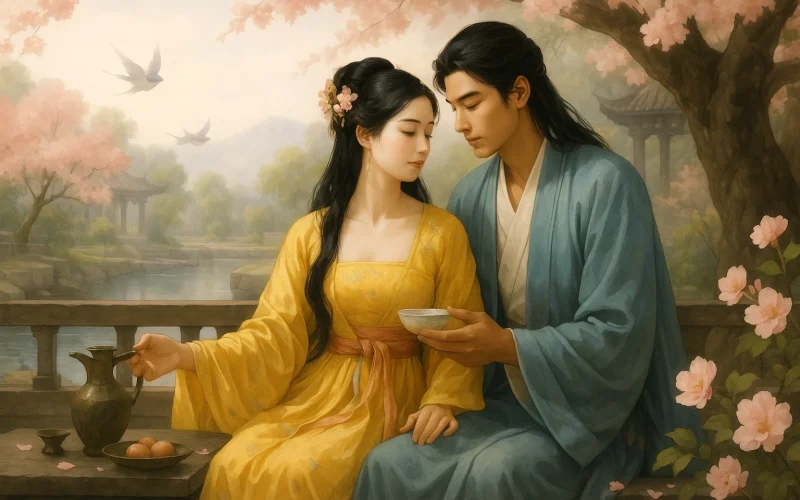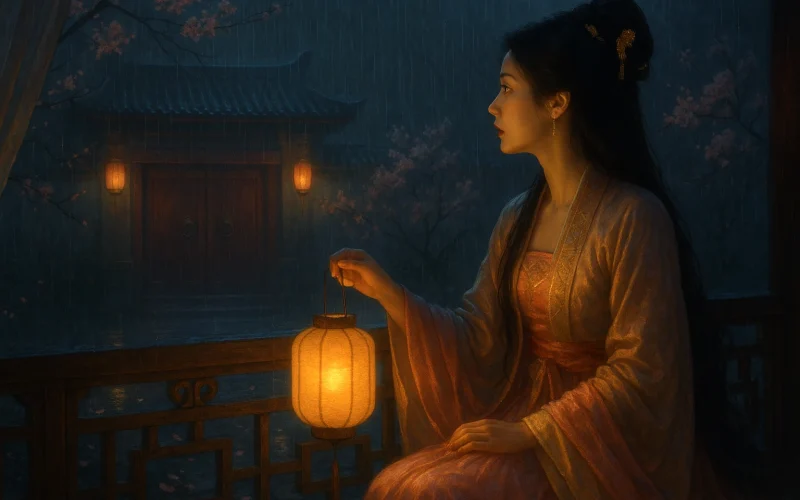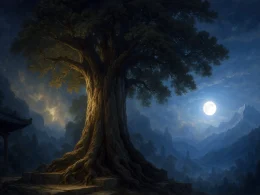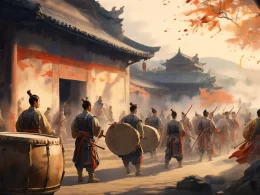Flowers fall on Stone Tower, rain veils the riverside hall,
Clouds shroud Long Isle—orchids fade at dusk’s call.
Fragrant grass shores drown in mist,
Who dwells where green willows twist?
Old travels, past affairs—
Where now roams the parting soul?
A lone orchid boat westward glides,
His spirit seeks Three Gorges’ shoals.
Original Poem
「应天长 · 石城花落江楼雨」
石城花落江楼雨,云隔长洲兰芷暮。
芳草岸,各烟雾,谁在绿杨深处住?旧游时事故,岁晚离人何处?
冯延巳
杳杳兰舟西去,魂归巫峡路。
Interpretation
Amidst the fractured Five Dynasties and Ten Kingdoms period, Feng Yansi served as a high-ranking minister preceding Li Yu's reign in the Southern Tang. His poetry, steeped in Jiangnan's cultural refinement, often reflects scholar-officials' melancholy amid turbulent times—nostalgia for lost companions, bygone travels, and time's inexorable flow. This ci, opening with late spring imagery, embodies parting sorrow while lamenting the irretrievability of past affections and life's transience, suffused with profound pathos.
First Stanza: "石城花落江楼雨,云隔长洲兰芷暮。芳草岸,各烟雾,谁在绿杨深处住?"
Shí chéng huā luò jiāng lóu yǔ, yún gé cháng zhōu lán zhǐ mù. Fāng cǎo àn, gè yān wù, shuí zài lǜ yáng shēn chù zhù?
Stone City: blossoms fall as rain veils riverside towers,
clouds sever Long Isle—orchids fade in twilight's hue.
Fragrant grasses line shores,
where mist and smoke entwine—
Who dwells in the green willow's shadowed depths?
Though ostensibly depicting scenery, every line pulses with unspoken emotion. The opening couplet—"blossoms fall as rain veils riverside towers"—instantly establishes a withering spring's desolate aura, where floral and meteorological descent merge into sorrow's backdrop. "Clouds sever Long Isle" (云隔长洲) conveys both physical separation and interpersonal distance, while "orchids fade in twilight" (兰芷暮) employs fragrant herbs (symbols of virtue) dimming in dusk to represent beauty's irreversible recession.
The stanza then narrows its gaze: "fragrant grasses" and "entwined mist" create a liminal space where memory and reality blur. The rhetorical question—"Who dwells in the green willow's shadowed depths?"—shifts from observation to introspection, organically bridging scene and sentiment through nature's veil.
Second Stanza: "旧游时事故,岁晚离人何处?杳杳兰舟西去,魂归巫峡路。"
Jiù yóu shí shì gù, suì wǎn lí rén hé chù? Yǎo yǎo lán zhōu xī qù, hún guī Wū Xiá lù.
Past joys and shared tales now lie obsolete—
as years wane, where roams the parted one?
A lone orchid-boat glides west,
vanishing…
as my soul trails toward Wu Gorge's unseen path.
Transitioning to recollection and lament, "past joys and shared tales now lie obsolete" (旧游时事故) compresses bygone intimacy into an amorphous, distant concept, weighted with unspoken grief. The plaintive inquiry—"as years wane, where roams the parted one?" (岁晚离人何处)—heightens the poignancy of irretrievable time and unfindable faces.
The concluding image—an "orchid-boat" (兰舟, classical emblem of farewells) receding into nothingness—is magnified by "vanishing" (杳杳) to underscore inaccessibility. The visceral "my soul trails toward Wu Gorge" (魂归巫峡路) elevates earthly longing to spiritual pilgrimage, merging poetic imagination with visceral sorrow. Here, Wu Gorge—a mythical lover's rendezvous in Chu poetry—becomes the ultimate unreachable destination, where memory and desire dissolve into the landscape.
Holistic Appreciation
This ci poem begins with the imagery of late spring's falling blossoms and culminates in the wistful longing of a departed soul, unfolding with a natural structure and clear progression. The first stanza paints a scene where emotions are subtly embedded, while the second delves deeper into sentiment, transitioning from observation to profound reflection. Through meticulous depictions of the present scenery, the poet connects memories of past journeys and longing for those who have departed, blending external landscapes with internal emotions to create an ethereal, melancholic yet restrained artistic ambiance. The language is elegant and understated, with culturally rich motifs such as "orchids and angelica," "fragrant grasses," "orchid boat," and "Wu Gorge" elevating the poem's aesthetic sophistication.
Artistic Merits
- Scenery and Emotion Intertwined, Layered Progression: The first stanza focuses on the misty, delicate scenery of late spring in Jiangnan, while the second deepens into expressions of parting sorrow, transitioning seamlessly.
- Allusions with Profound Meaning: "The soul returns to Wu Gorge" subtly alludes to the Chu Ci legend of the Goddess, evoking a sense of longing for the unattainable, enriching the emotion with mystique and symbolism.
- Graceful Language, Steady Rhythm: The diction is refined, the couplets balanced, and the rhythm gentle, leaving a lingering resonance.
- Rhetorical Questions Evoke Emotion, Ethereal Negative Space: Lines like "Who dwells deep in the green willows?" and "Where has the departed gone?" draw readers into the poet's emotions while leaving space for reflection.
Insights
This ci reminds us to cherish and deeply observe the joys and sorrows of human connections. Through delicate scenery and subtle lyricism, the poet emphasizes that neither the picturesque beauty of spring nor the irretrievable past can endure—only the memories held close in the heart remain. Life is fleeting, emotions fade, and memories blur, yet what endures is often the buried longing within. This method of expressing emotion through scenery and implication not only sets a lyrical precedent for later generations but also inspires us to convey complex feelings through details, imagery, and atmosphere, imparting deeper emotional resonance.
About the Poet
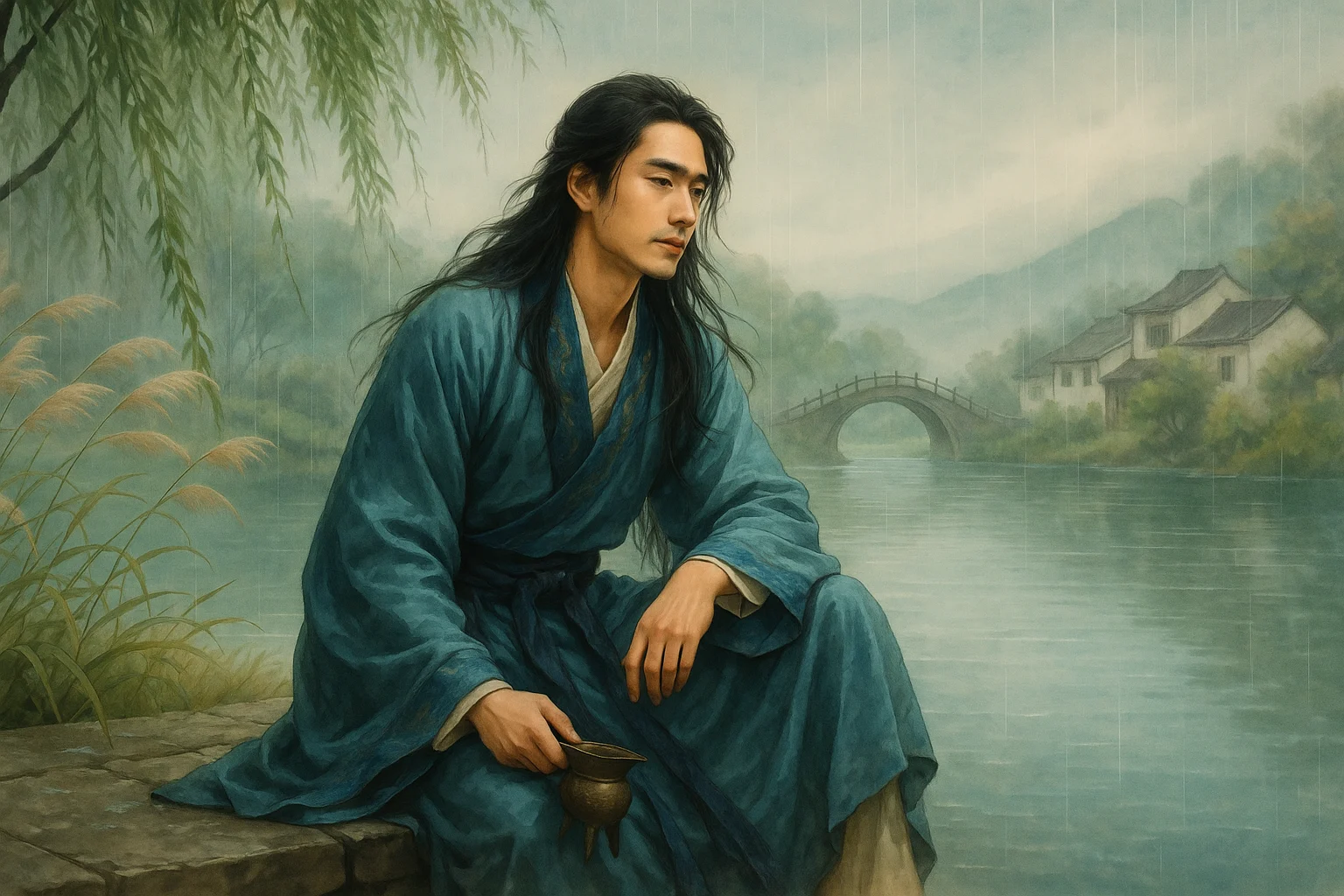
Feng Yansi (冯延巳 903 - 960), courtesy name Zhengzhong, was a native of Guangling (modern-day Yangzhou, Jiangsu) and a renowned ci poet of the Southern Tang during the Five Dynasties and Ten Kingdoms period. Rising to the position of Left Vice Director of the Department of State Affairs (Zuo Puye Tongping Zhangshi), he enjoyed the deep trust of Emperor Li Jing. His ci poetry forged a new path beyond the Huajian tradition, directly influencing later masters like Yan Shu and Ouyang Xiu, playing a pivotal role in the transition of ci from "entertainment for musicians" to "literary expression of scholar-officials."







